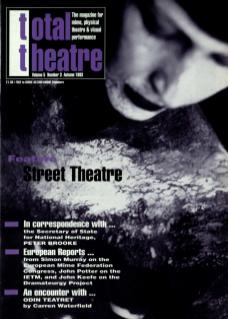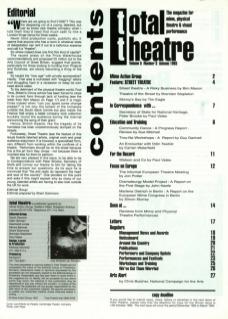‘Where are we going to find £1500?’ This was the despairing cry of a young, talented, but just as broke new theatre company when I told them they'd need that much cash to hire a London fringe venue for three weeks.
Never mind production costs, publicity, etc; it seems that anyone who has a room in whatever state of dilapidation can rent it out at a ludicrous expense and call it a ‘theatre’.
So where indeed does one find this kind of capital?
The recent press of the Price Waterhouse recommendations and proposed £5 million cut to the Arts Council of Great Britain, suggest that grants, particularly for those looking to funding from Projects and Schemes, are slowly becoming a thing of the past.
So does this herald the ‘new age’ with private sponsorship? Hardly. That area is inundated with ‘begging’ letters and struggling hard in a recession to keep its own head above water.
To the detriment of the physical theatre world, Fool Time, Britain's Circus school has been forced to close in its current form through lack of funding (see the letter from Bim Mason on Page 17) and it is tragic times indeed when ‘can you spare some change please?’ is not only the lament of the homeless outside the South Bank Centre but also inside the Festival Hall, where a ballet company took collection buckets round the audience during the interval, announcing the axing of their grant.
Hence, British theatre, like the tragedy of its homeless, has been unceremoniously dumped on the streets.
Fortunately, Street Theatre (see the feature of this issue) boasts talented artists, original work, and great audience enjoyment. It is, however, a specialised form, very different from working within the confines of a theatre. Performers should be on the street because this is the artform they chose – not because there is nowhere else for them to perform.
We are very pleased in this issue, to be able to be In Correspondence with Peter Brooke, Secretary of State, and convey our thanks to him for taking the time to answer our questions. As he says, he is convinced that ‘the arts really do represent the heart and soul of the country’. One ponders on this point and asks if this might explain why so many of our young, talented artists are having to also look outside the UK for work.

